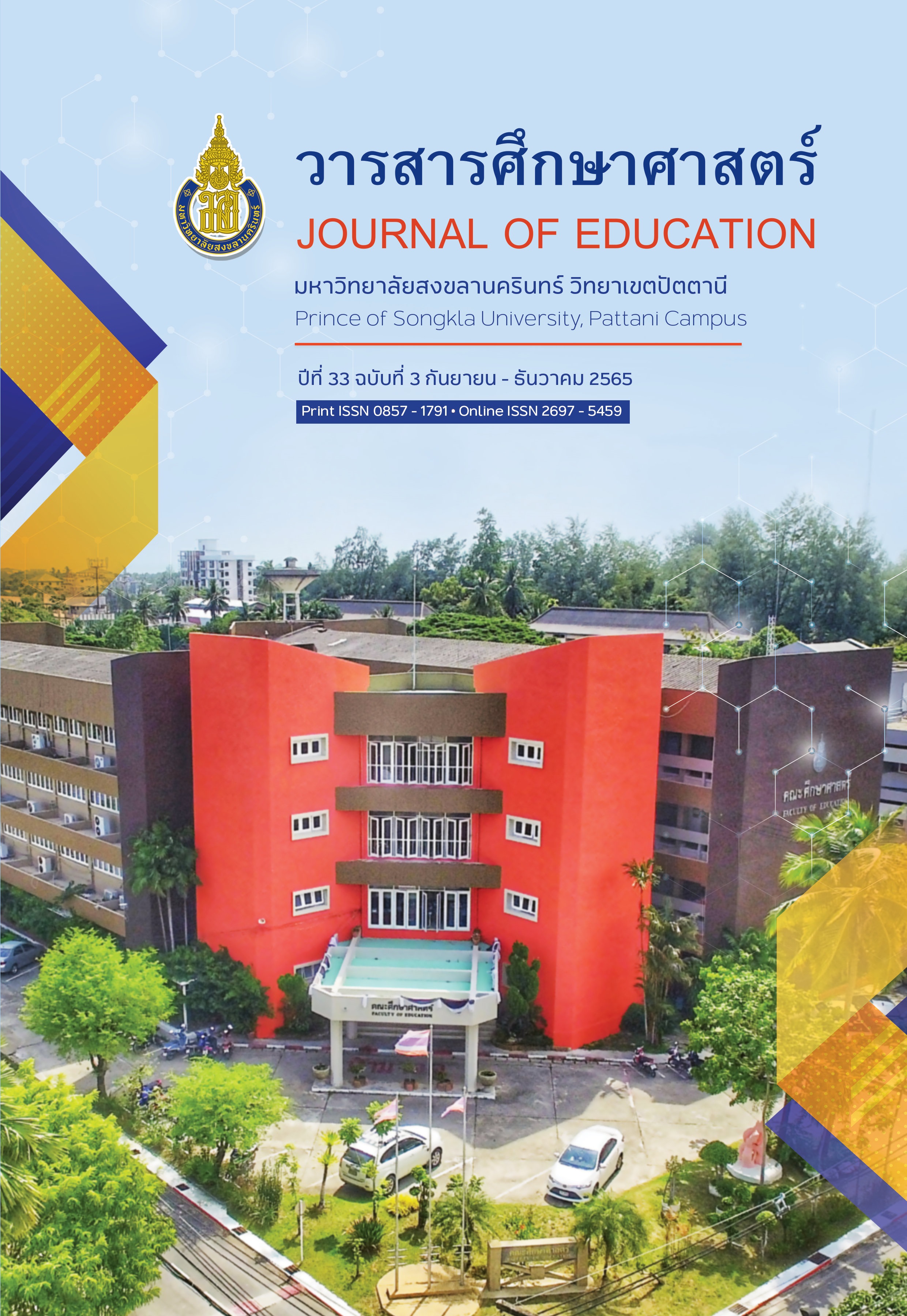การศึกษาคุณลักษณะที่พึงประสงค์ของนักเรียนคุณภาพ สำหรับสังคมโลกในอนาคต
Main Article Content
บทคัดย่อ
การวิจัยเชิงคุณภาพเรื่องนี้มีวัตถุประสงค์เพื่อศึกษาคุณลักษณะที่พึงประสงค์ของนักเรียนคุณภาพในสังคมโลกอนาคต โดยใช้วิธีวิจัยเชิงคุณภาพ (Qualitative research) ขั้นตอนการวิจัยมี 2 ขั้นตอน คือ 1) ศึกษากรอบแนวคิดการวิจัยโดยการทบทวนวรรณกรรม จำนวน 21 รายการ เครื่องมือที่ใช้ คือ แบบสังเคราะห์เนื้อหา วิเคราะห์ข้อมูลโดยการวิเคราะห์เนื้อหา 2) ประเมินร่างคุณลักษณะที่พึงประสงค์ของนักเรียนคุณภาพในสังคมโลกอนาคต โดย (1) ประชุมสนทนากลุ่มผู้ทรงคุณวุฒิ จำนวน 21 คน และ (2) สัมภาษณ์ตัวแทนนักเรียน จำนวน 6 คน ผู้ให้ข้อมูลได้จากการเลือกแบบเจาะจง เครื่องมือที่ใช้ คือ แบบแสดงความคิดเห็นและแบบสัมภาษณ์แบบมีโครงสร้าง วิเคราะห์ข้อมูลโดยการวิเคราะห์เนื้อหา ผลการวิจัย พบว่า คุณลักษณะที่พึงประสงค์ของนักเรียนคุณภาพในสังคมโลกอนาคต ประกอบด้วย 4 ด้านหลัก แต่ละด้านประกอบด้วย 10 องค์ประกอบย่อย ได้แก่ ด้านที่ 1 คุณลักษณะด้านผู้นำทางสังคมและอารมณ์ (Social and Emotional leader) ด้านที่ 2 คุณลักษณะด้านผู้นำทางคุณธรรม จริยธรรม และค่านิยม (Virtue, Ethical and Values leader) ด้านที่ 3 คุณลักษณะด้านผู้นำการเปลี่ยนแปลง (Change leader) ด้านที่ 4 คุณลักษณะด้านผู้นำนวัตกรรมและผู้ประกอบการ (Innovative and Entrepreneurial leader) ผลการวิจัยนี้จะสามารถเป็นแนวทางให้ผู้กำหนดนโยบายหรือผู้บริหารสถานศึกษากำหนดคุณลักษณะที่พึงประสงค์ของผู้เรียนให้มีความสอดคล้องกับบริบทสังคมโลกที่เป็นพลวัตได้ ทั้งนี้ สถานศึกษาควรพัฒนาให้นักเรียนมีความเป็นผู้นำที่สามารถนำตนเองและผู้อื่น เพื่อทำให้เกิดการเปลี่ยนแปลงในโลกอนาคตได้อย่างยั่งยืน
Article Details

อนุญาตภายใต้เงื่อนไข Creative Commons Attribution-NonCommercial 4.0 International License.
เอกสารอ้างอิง
Alston, J. M. (2018). 10 Characteristics of Successful Students. Retrieved 12 July 2019, from https://inomics.com/insight/10-characteristics-of-successful-students-602112
Anderson, P. (2002). Assessment and development of executive function (EF) during childhood. Child Neuropsychology, 8(2), 71–82.
Australian Curriculum, Assessment and Reporting Authority (ACARA:Australia). (2013). General Capabilities. Retrieved 15 May 2019, from http://docs.acara.edu.au/resources/General_Capabilities_2011.pdf
Bass, Bernard M. (1999). Transformational leadership: industrial, military, and educational impact. NJ: Lawrence Erlbaum Associates.
Bunnag, C. (2019). Effective governance: concepts of management principles for sustainable development. Retrieved 15 February 2021, from https://www.sdgmove.com/2019/09/30/effective-governance. [in Thai]
Chareonwongsak, K. (2003). Future images and desirable characteristics of Thai people (Research Report). N.P.: Office of the National Education Commission. [in Thai]
Chamornman, U. (1988). Research Synthesis: Quantitative. Bangkok: Panni Plublishing. [in Thai]
Cohen, L., Manion, L., & Morrison, K. (2010). Research methods in education (6th ed.). NY: Routledge.
Dechakup, P. (2014). Learning Management in the 21st Century. Bangkok: Chulalongkorn University Press. [in Thai]
Division of Educational Administration and Quality Assurance. (2017). Thailand 4.0: Model to drive Thailand towards prosperity, stability and sustainability. [in Thai]
Ganowicz-Baczyk, A. (2016). Anthropocentric Character of the Principle of Sustainable Development. In Kureethadam J. I., Łepko Z., Sadowsk R. F. (Editors), Returning to the Home. Ways to Recover our Common Home (pp.272-295). Rome: Libreria Ateneo Salesiano.
Goleman, D. & Boyatzis, E. R. (2017). Emotional Intelligence Has 12 Elements. Which Do You Need to Work On?. Retrieved from https://hbr.org/2017/02/emotional-intelligence-has-12-elements-which-do-you-need-to-work-on
Higgs, M. & Rowland, D. (2008). Change and its Leadership Change Leadership that Works: The Role of Positive Psychology. Organisations & people, 15(2).
Horney, N., & O’Shea, T. (2015). Focused, fast and flexible: Creating agility advantage in a VUCA World. CA: BookBaby.
International Baccalaureate (IB). (2013). IB learner profile. International Baccalaureate.
Mackay, C. (2019). 10 Qualities You Find in Good Students and Good Citizens. Retrieved from https://sites.google.com/site/mrsdicarnesseventhgradeclass/characteristics-of-a-good-student
Manders, K. (2014). Leaders Make the Future: Ten New Leadership Skills for an Uncertain World [review] / Bob Johansen. The journal of applied Christian leadership, 8(1), Retrieved from https://digitalcommons.andrews.edu/cgi/viewcontent.cgi?article=1168&context=jacl
Merriam, S. B. (1998). Qualitative research and case study applications in education. San Francisco. CA: Jossey-Bass.
Ministry of Education, Culture, Sports, Science and Technology: (MEXT) Japan. (2006). Basic Act on Education. Retrieved from http://www.mext.go.jp/en/policy/education/lawandplan/title01/detail01/1373798.htm
MOE. (2008). Basic Education Core Program 2008. Ministry of Education. [in Thai]
MOE. (2017). Basic Education Core Program B.E. 2551, revised version 2017. Ministry of Education. [in Thai]
MOE. (2021). Our Mission and Vision. Retrieved 20 February 2021, from https://www.moe.gov.sg/about-us/our-mission-and-vision
National Education Act 2019. (2019, 1 May) Government Gazette. (2019). Volume 136, chapter 57. Pages 49-53. in Thai]
Nordin, N. & Norman, H. (2018). Mapping the fourth industrial revolution global transformations on 21st century education on the context of sustainable development. Journal of sustainable development education and research | JSDER, 2(1), 1-7.
OECD. (2018). Preparing our youth for an inclusive and sustainable world: The OECD PISA global competence framework. N.P.: OECD.
OECD. (2019). The future of education and skills Education 2030: OECD Learning Compass 2030 A Series of Concept Notes. France: Organisation for Economic Co-operation and Development.
Office of the Education Council (2019). National Education Standards 2018. (1st edition). Bangkok: 21st Century. [in Thai]
Office of the Health Promotion Fund (Thai Health Promotion Foundation) and the RLG Institute (Rakluk Learning Group). (2018). EF Executive Funtions for children ages 13-18 for parents and teachers. Bangkok: ID All Digital Print. [in Thai]
Partnership for 21st Century Learning (P21). (2019). Framework for 21st Century Learning. Retrieved 15 April 2019, from https://www.battelleforkids.org/networks/p21/frameworks-resources
Rakluke Learning Grou. (2018). EF (executive functions). Retrieved from https://www.rakluke.com/brain/ [in Thai]
Razzouk, R. (2012). What Is Design Thinking and Why Is It Important?. Review of Educational Research, 82(3). Retrieved from https://www.researchgate.net/publication/258183173_What_Is_Design_Thinking_and_Why_Is_It_Important
Siribanpitak et al. (2018). Developing a Mechanism to Drive the Production System and Developing High-Performance Teachers for Thailand 4.0. Bangkok: Prigwhan Graphic. [in Thai]
Sribuaiam, K. (2016). Environmental justice (Research Report). N.P.: Institute of Education Policy sponsored by the Conrad Adenau Foundation. [in Thai]
Thaweephok, T. (2015). A great feature of entrepreneurs, small and medium enterprises (Research Report). Bangkok: business and enterprise development incubator Thonburi Rajabhat University. [in Thai]
The council of the european union. (2018). Council recommendation of 22 May 2018 on key competences for lifelong learning. Retrieved from https://eur-lex.europa.eu/legal-content/EN/TXT/PDF/?uri=CELEX:32018H0604(01)&rid=7
UNESCO. (2019). Assessment of Transversal Competencies Current tools in the Asian Region. N.P.: The United Nations Educational, Scientific and Cultural Organization.
Venn, A. (2019). Social justice and climate change. Managing Global Warming An Interface of Technology and Human. Retrieved from https://www.sciencedirect.com/topics/earth-and-planetary-sciences/intergenerational-equity
World Economic Forum (WEF). (2018). The Future of Jobs Report 2018. Retrieved from http://www3.weforum.org/docs/WEF_Future_of_Jobs_2018.pdf


